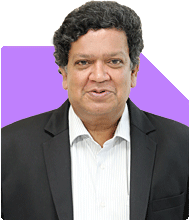Namita Piparaiya | Answer |Ask -Follow
Yoga, Wellness Expert - Answered on Jun 21, 2023
Piparaiya has completed over 700 hours of Yoga Alliance certified training in Hatha Yoga from Indea Yoga, Mysore. She specialises in pranayama, Ayurveda, yoga philosophy and corrective exercises and regularly conducts training and educational programmes for individuals and corporate organisations.... more

Hi Namita , my daily exercise schedule as 35 min fast walk,15min playing badminton ,after 20 min rest and taking fruit myself doing yoga which include kapalbhati,anulom milone, basrika,mandukasan, . From last 2 years myself facing alargic rhynthetic problem .After many advice from from allopathy i am not getting proper results ,Please advice.
You may like to see similar questions and answers below
Rebecca Pinto | Answer |Ask -Follow
Physiotherapist, Nutritionist - Answered on May 13, 2023
Dr Ashit Hegde | Answer |Ask -Follow
Consultant Physician, Internal Medicine and Critical Care Expert - Answered on Sep 21, 2023
Rebecca Pinto | Answer |Ask -Follow
Physiotherapist, Nutritionist - Answered on Sep 29, 2023
Dr Ashit Hegde | Answer |Ask -Follow
Consultant Physician, Internal Medicine and Critical Care Expert - Answered on Sep 20, 2023
Dr Karthiyayini Mahadevan | Answer |Ask -Follow
General Physician - Answered on Dec 11, 2023
Dr Shyam Jamalabad |107 Answers |Ask -Follow
Dentist - Answered on Dec 05, 2025
Dr Shyam Jamalabad |107 Answers |Ask -Follow
Dentist - Answered on Dec 05, 2025
Dr Dipankar Dutta |1836 Answers |Ask -Follow
Tech Careers and Skill Development Expert - Answered on Dec 05, 2025
Ulhas Joshi |280 Answers |Ask -Follow
Mutual Fund Expert - Answered on Dec 05, 2025
Dr Dipankar Dutta |1836 Answers |Ask -Follow
Tech Careers and Skill Development Expert - Answered on Dec 04, 2025
Ravi Mittal |676 Answers |Ask -Follow
Dating, Relationships Expert - Answered on Dec 04, 2025
Anu Krishna |1745 Answers |Ask -Follow
Relationships Expert, Mind Coach - Answered on Dec 04, 2025
Anu Krishna |1745 Answers |Ask -Follow
Relationships Expert, Mind Coach - Answered on Dec 04, 2025
Mayank Chandel |2562 Answers |Ask -Follow
IIT-JEE, NEET-UG, SAT, CLAT, CA, CS Exam Expert - Answered on Dec 04, 2025
Mayank Chandel |2562 Answers |Ask -Follow
IIT-JEE, NEET-UG, SAT, CLAT, CA, CS Exam Expert - Answered on Dec 04, 2025






























